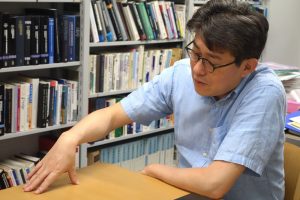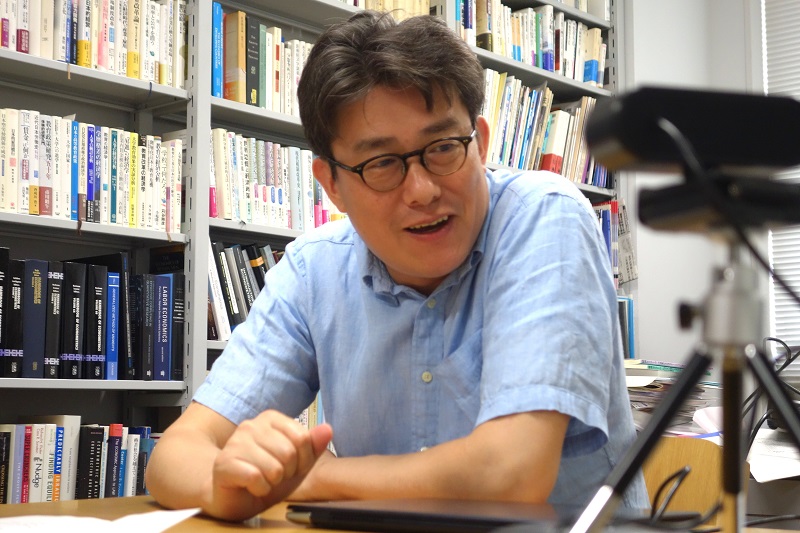The field of my specialisation, labour economics, is one which examines labour phenomena through a unified framework in economics.
 Labour has a very close relationship with our daily lives and is tied to a wealth of data starting from the government’s statistics, and public and private administrative records. By analyzing this data we can understand different relationships, such as that between educational attainment and income. Connecting these results with decision-making in government is the purpose of labour economics.
Labour has a very close relationship with our daily lives and is tied to a wealth of data starting from the government’s statistics, and public and private administrative records. By analyzing this data we can understand different relationships, such as that between educational attainment and income. Connecting these results with decision-making in government is the purpose of labour economics.
One example is the question of investing public funds into education, in which we want to know the influence of education investment on productivity. If we can apply a common standard, we can uncover the effect on productivity from the relation between educational attainment and income.
Of course, conclusions from data analysis cannot be straightforwardly used to decide policy by themselves. One example we can look at is the minimum wage.
Traditionally, economists take the view that wage increases must be treated with caution since rises in the minimum wage have negative effects on employment. From real-world figures, analysis of data in Japan after the 2007 amendment of the Minimum Wage Act showed that, in areas where the minimum wage rose such as Tokyo, Kanagawa, Osaka and Hokkaido, employment of young males decreased.
 However, removing barriers to wage increases is a central function of economic policy, and political pressure to raise minimum wages is building up. As support for wage increases exists in all political parties from the LDP to the JCP, its introduction is inevitable. This is not a decision informed by knowledge from labour economics, but rather a result of democratic policy-making I would say.
However, removing barriers to wage increases is a central function of economic policy, and political pressure to raise minimum wages is building up. As support for wage increases exists in all political parties from the LDP to the JCP, its introduction is inevitable. This is not a decision informed by knowledge from labour economics, but rather a result of democratic policy-making I would say.
Still, this doesn’t mean that the knowledge of labour economics plays no role in policymaking – the truth is, it provides the basis for discussion. Furthermore, it’s possible to consider additional policies to respond to concerns about falling employment among male youths. Deciding on policy through democratic procedures backed by comprehensive findings from academia is a sound process, from my point of view, even if the end result differs from what we propose.
Out of the two classes which I teach, one is econometrics. By referencing examples like the one of minimum wage, I make a point of discussing specifically how econometrics is actually used.
The other class I teach together with a teaching practitioner is case studies. My students gain experience in project work by forming groups and working with representatives from local municipalities, aiming to answer the question of just how econometrics is put into practice.
For example, in the past one study was conducted with the Yamanashi prefectural government regarding their Covid-19 response and the resulting influence on public health and economic activity.
At the time, Yamanashi embraced Covid-19 measures which differed from other municipalities. In place of compensation schemes for the lockdowns, businesses were not forced to shorten operating hours provided they had thorough infection countermeasures in place. The survey targeted the results of this practice.
Through a comparison with other surrounding prefectures, it was found that Yamanashi had managed to suppress infection numbers while limiting reductions in restaurant visitors. The teaching practitioner and three students published this result as co-authors in the academic journal Scientific Reports.
 In labour economics, analysis is performed on the basis of data, but any assumptions in the analysis are formed using a social science approach.
In labour economics, analysis is performed on the basis of data, but any assumptions in the analysis are formed using a social science approach.
This is because the assumptions must come from the outside, and not simply by looking at the data, so judging whether they reflect reality requires social common sense and economic theory.
I’ve always enjoyed social studies, and been fascinated by the approach of taking a hypothesis, deducing a prediction and using data to verify it. This interest in empirical research led to my current primary research area.
That’s why I believe that labour economics is a good field for anyone with an interest in empirical research thinking of studying economics. I think you can say it is suited to those who lean more toward the side of social science than the theoretical/mathematical side of economics.
On the other hand, it might seem the opposite of what I’ve just said, however in order to see what’s really interesting about labour economics, some understanding of mathematics is also needed.
Without a doubt, it is an area that deepens the more you think about it, so to anyone considering to enter GraSPP, I absolutely recommend studying some mathematics and taking up this challenge.



